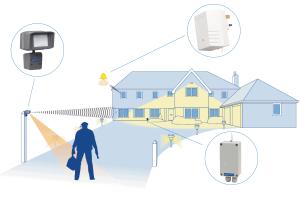How to Detect Intruders: Signs Someone is in Your House

-
Quick Links:
- Understanding Home Invasion
- Common Signs of an Intruder
- How to Secure Your Home
- What to Do if You Suspect an Intruder
- Case Studies: Real-Life Scenarios
- Expert Insights on Home Security
- FAQs
Understanding Home Invasion
Home invasion is a terrifying reality for many homeowners. Understanding what constitutes a home invasion and the psychology behind it can help you better prepare to protect your space. A home invasion typically occurs when an intruder unlawfully enters a residence with the intent to commit a crime, often escalating to violence. Recognizing the signs of a potential intruder can significantly enhance your security measures.
Common Signs of an Intruder
Detecting an intruder early on can be the difference between a safe home and a dangerous situation. Here are some of the most common signs that someone might be in your house:
- Unusual Noises: Listen for unfamiliar sounds, such as footsteps, voices, or breaking glass.
- Moved Items: Take note if items are out of place or have been moved without your knowledge.
- Pets Acting Strange: Animals often sense intruders before humans do. If your pets are acting anxious or barking at nothing, pay attention.
- Open or Closed Doors: Check to see if doors are ajar that you are certain you closed.
- Lights Flickering: Sudden changes in your home’s lighting can indicate an intruder tampering with electrical systems.
How to Secure Your Home
Preventing a home invasion begins with proactive security measures. Here are some effective strategies:
- Install Security Cameras: Visible cameras deter intruders and help you monitor activities around your home.
- Use Smart Home Devices: Smart locks and alarms can alert you of unauthorized access.
- Reinforce Entry Points: Use deadbolts and secure your windows to make it more difficult for intruders to enter.
- Neighborhood Watch Programs: Connect with your neighbors to keep an eye on each other’s properties.
What to Do if You Suspect an Intruder
If you suspect that someone is in your house, it’s critical to remain calm and follow these steps:
- Do Not Confront: Avoid confronting the intruder; your safety is the priority.
- Call for Help: Immediately contact law enforcement and provide them with your address and details.
- Find a Safe Location: If possible, find a safe place to hide until help arrives.
- Monitor the Situation: Use your phone to listen and monitor any sounds that could provide information to the authorities.
Case Studies: Real-Life Scenarios
Examining real-life incidents can provide valuable insights into home invasions. Here are a few notable cases:
Case Study 1: The Intruder Next Door
In a suburban neighborhood, residents reported hearing strange noises at night. Upon investigation, a neighbor discovered that an individual had been entering homes through unlocked back doors. This prompted a community meeting where residents discussed enhancing security measures.
Case Study 2: The Alert Dog
A family’s dog alerted them to a potential intruder. The dog’s barking led the family to check their home while they contacted the police. The quick response and the dog's vigilance prevented a burglary.
Expert Insights on Home Security
We consulted security experts to gather insights on protecting your home effectively:
“Awareness is key. The more you understand the behaviors of intruders, the better you can protect your home. Always be proactive rather than reactive.” - Jane Doe, Home Security Expert
FAQs
1. What should I do first if I think someone is in my house?
Stay calm, avoid confrontation, and call the police immediately.
2. How can I tell if my home has been broken into?
Look for signs such as damaged locks, disturbed personal belongings, or signs of forced entry.
3. What are some common methods burglars use to enter homes?
Burglars often use unlocked doors, windows, or can manipulate weak locks to gain entry.
4. Are there specific times when home invasions are more likely to occur?
Many home invasions occur during the day when residents are at work or school.
5. Can security systems prevent home invasions?
Yes, security systems act as a deterrent and can alert you and authorities in case of a breach.
6. What role do neighbors play in home security?
Neighbors can help watch over your property, report suspicious activities, and participate in community watch programs.
7. How important is it to have a plan in case of an intruder?
Having a plan increases your chances of staying safe and can help you react quickly in a crisis.
8. What are the legal implications of confronting an intruder?
It's essential to understand your local laws regarding self-defense and the use of force. It's generally advised to avoid confrontation.
9. How can I make my home less appealing to burglars?
Keep your property well-lit, maintain your yard, and secure all entry points to make it less attractive to potential intruders.
10. Are there any apps that can help with home security?
Yes, there are various home security apps available that allow you to monitor your home remotely and receive alerts.